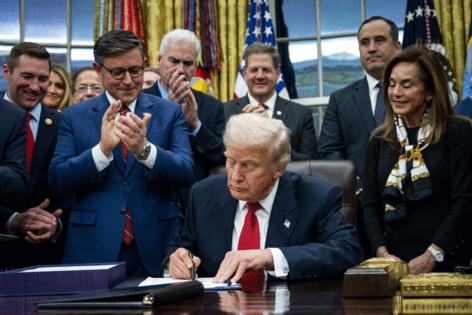Clive Crook: Congratulations -- The shutdown left health care's mess intact
Published in Op Eds
The strangest thing about the recent shutdown fight in Congress is that a quarrel ostensibly about health-care subsidies failed to stir any real debate about health-care reform.
Washington prefers not to open that can of worms. The fact remains, this system’s defects weren’t just the proximate cause of the past month’s paralysis. They also help drive the country’s deeper political and fiscal dysfunction.
Democrats refused to keep the government running unless so-called enhanced Affordable Care Act subsidies — introduced in 2021 in response to the pandemic and scheduled to expire at the end of this year — were extended. Letting the additional subsidies disappear would raise the cost of insurance for many Americans and impose especially steep increases on families making between 400% and 500% of the poverty line (that is, between $129,000 and $161,000).
The income-related cutoff in the original ACA was too abrupt. Restoring it now that premiums are much higher than four years ago is harsh and disruptive. It would doubtless cause many families who suddenly found themselves on the wrong side of the subsidy cliff to go uninsured.
So yes, this needs fixing. Two problems. Permanently extending the pandemic enhancement would cost about $350 billion over 10 years — $350 billion that the government doesn’t have.
Also, making this patch of the ACA a condition for keeping the government running doesn’t seem all that, you know, democratic, given that Democrats issued their ultimatum in defiance of the White House and majorities in both houses of Congress: “Mend our broken health reform, or we shut Washington down.” Who could refuse?
Both parties are muddled. The Democrats’ position is that Obamacare was a historic triumph — but letting it revert to its pre-pandemic design will cause great suffering. The Republicans’ position is that it was a historic error — but they’ve no idea how to correct it. Congresswoman Marjorie Taylor Greene says her party should “start formulating” a plan. What has it been doing for the past 15 years? House Speaker Mike Johnson says he’s got “notebooks full of ideas.” I think he means notebooks full of excuses.
A short-term fix for the abrupt increase in post-subsidy premiums is indeed likely: Republicans will want the issue to go away between now and the mid-terms. But a tweak is all it will be.
Every few decades, battles over this issue show how difficult real health-care reform is. Even Obamacare — “a big (expletive deleted) deal,” as somebody once said — was very far from comprehensive reform. But grappling with the root causes of dysfunction is what’s needed; sooner or later it will happen, or else this ludicrous system might tank the entire economy.
These points are familiar but bear repeating: Health spending in the U.S. stands at 17% of gross domestic product and the trend is upward. Comparable countries spend an average of 11%. (In dollar terms, the U.S. spends more than twice as much per capita on health as the UK, even though Britain’s NHS provides universal coverage.)
In return for colossal, ever-increasing public and private outlays, Americans on most measures get worse results, and millions of them are left under-insured or uninsured. Providers and insurers are paid too much. The system purports to be market-based. It isn’t. Pricing is opaque and the competitive pressures that deliver cost-effectiveness in other industries are almost entirely absent.
Anxiety over the cost and complexity of health care and the attendant threat of financial ruin is pervasive. It’s part of the economic insecurity that fuels political disenchantment and partisan polarization. The growing fiscal burden will eventually be insupportable.
Given all that, the system’s resilience is impressive. The critical ingredient, without doubt, is its reliance on tax-sheltered employer-provided insurance. First adopted as a way to evade wage controls (talk about unintended consequences) during World War II, it has deluded tens of millions of Americans into thinking their health care is free — and they won’t stand for this precious gift being taken away.
In fact, of course, they’re paying for it in the form of much lower wages. But the system draws a veil over costs to users, enabling systemic inefficiencies, empowering rent-seekers and guaranteeing that any serious efforts at reform will be unpopular. Hence Obamacare, which delivered improvements at the margin but left the underlying dystopia intact. “If you like your health insurance, you can keep it.” That was both false advertising, as it turned out, and a declaration that the bones of the system would be left alone.
Universal affordable health care will demand what it has demanded everywhere else: a public guarantee of access, higher taxes to pay for that guarantee and regulated prices to keep costs under control. Perhaps, given a fiscal crisis much more unsettling than a six-week government shutdown, it will one day be done all at once. More likely, it will happen piece by piece. Ideally, start with a public option to buy into Medicare, and use that as a lever for the rest.
But not right now. How sad that a fight over health-care subsidies which shuttered the federal government isn’t enough to bring actual reform to the public’s attention.
_____
This column reflects the personal views of the author and does not necessarily reflect the opinion of the editorial board or Bloomberg LP and its owners.
Clive Crook is a Bloomberg Opinion columnist and member of the editorial board covering economics. Previously, he was deputy editor of the Economist and chief Washington commentator for the Financial Times.
_____
©2025 Bloomberg L.P. Visit bloomberg.com/opinion. Distributed by Tribune Content Agency, LLC.
























































Comments